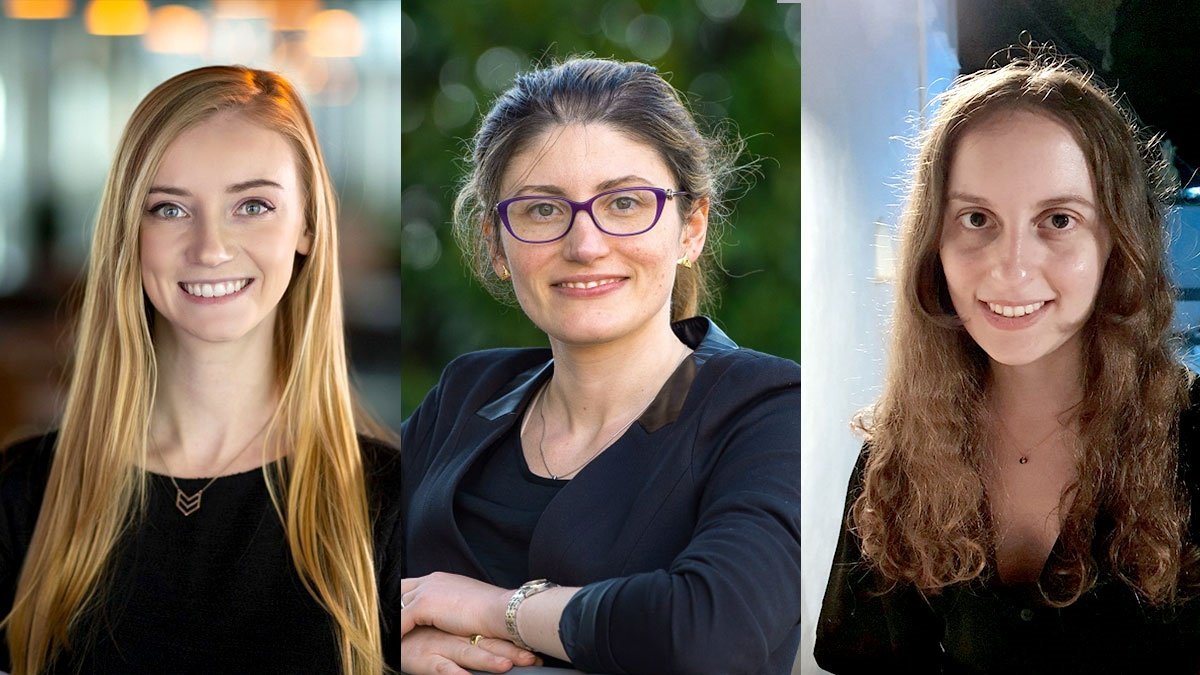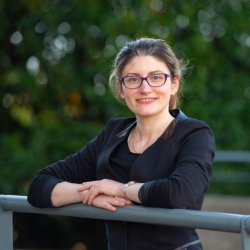Following in Daphne’s footsteps: Meet our female computer scientists
Surrey is home to an incredible range of female computer scientists who have made their mark in research, industry and public engagement. As part of our Year of Surrey Women in Science & Engineering – marking 50 years since Daphne Jackson became the UK’s first female Professor of Physics at Surrey – we talk to just a few of them.

(L-R) Holly Boothroyd, Ioana Boureanu, Eleni Vafeiadi Bila.
Professor Daphne Jackson is a key figure in the history of UK science. How does her story resonate with you?
Holly Boothroyd (alumni): Stories like Dame Daphne Jackson’s remind me how far we’ve come, but also how far we have yet to go. She inspires me to keep striving for my personal career goals while lifting others up alongside me to create a more diverse and inclusive industry. When science and technology are representative of the world, we all win.
Dr Ioana Boureanu (Senior Lecturer): It certainly resonates: I wasn’t sensitive to the gender gap until I came to the UK to study for a PhD in the Computing Department of a well-known university. As the only female on a whole floor of early career researchers I used to be called ‘the girl’.
Who have been the influential women in your academic journey and why?
Eleni Vafeiadi Bila (PhD student): One of the women who influenced me the most was my secondary school math teacher. Her enthusiasm for the subject and ability to communicate the beauty of mathematics (even to students at novice level) inspired me to explore the field further.
Ioana: My maternal grandmother has been the person who has influenced my development, in all senses, the most.
Holly: My love of tech was something I largely kept to myself growing up: it was as a student at Surrey that I met my first female techie friends. The joy I got from being my authentic self and embracing what I loved inspired me to start connecting with the wider tech community and encouraging others to do the same.
What first got you interested in computer science?
Ioana: Maths was my passion originally and I enrolled on a maths and computer science degree knowing little about computer science. I soon discovered that it is a very different discipline: for example, writing a correct, efficient computer program may involve structured thinking and even some maths, but it also requires a host of other skills such as understanding systems’ architecture. It was taking on these new challenges that I found attractive.
Holly: Playing video games from a young age with my dad sparked my love of technology. We would speak about how we’d change the games and the tech that went into creating them. I started to want to learn to create games and this led me to learn to program during a C++ games programming camps where my journey began.
Tell us about your current role, and what you most enjoy about it.
Eleni: I’m a PhD student in a group led by Dr Brijesh Dongol, working on formal verification in the context of persistent memory. I have most enjoyed studying logic and using formal proof assistants such as Isabelle.
Ioana: I’m a Senior Lecturer in Secure Systems within the Department of Computer Science, but also Deputy Director of the Surrey Centre for Cyber Security, Deputy Director of the University of Surrey’s Gold-level Academic Centre of Excellence in Cyber Security Education (ACE-CSE) and Director of the GCHQ-recognised MSc in Information Security… the list goes on! I enjoy doing research and teaching topics related to that, and my role combines both.
Holly: I’m a Software Engineer II on the Microsoft Search, Assistance, and Intelligence team based out of London. I’ve worked on a few projects during my time at Microsoft that have showed me what I truly love about working in tech: pursuing innovation, exploring new spaces in human-computer interaction, and the ability to have an impact at scale.
Is there a particular female scientist whose work inspires you?
Eleni: Nancy Ann Lynch for her work on the theory of distributed systems and Susan Owicki for her work on proof techniques for parallel programs.
Ioana: Shafi Goldwasser, a computer scientist and winner of the Turing Award in 2012.
Holly: Dr Gladys West was massively important in the creation of GPS technology. For many years, her contributions weren’t recognised widely. Thankfully, recent public awareness about her and other women – especially women of colour – who have had their contributions erased from history have finally been given the recognition and credit they deserve.
What’s the main barrier to women studying STEM subjects and going into STEM careers, and how can we do more to support them?
Eleni: The traditional family structure is perhaps the biggest reason for the lack of representation of women in science. Promotion of science as an endeavour for everyone (not just men or just women) would be the best way forward.
Ioana: In my opinion there’s no barrier other than society. That will only change if mentalities are shaped differently from early on – for example at nursery – so it will take a generation or more for a systematic change to happen.
Holly: "Studies show that around 12-13 years old, girls dramatically lose interest in pursuing STEM subjects, but when we introduce them to role models and give them exposure to what STEM careers are really like, their interest jumps back in. Access to quality STEM education, particularly computer science (which often doesn’t have equal access across schools), needs to be improved."
What advice or hopes do you have for the next generation of women scientists?
Eleni: I hope that the work I complete during my PhD will be useful and that, ultimately, my presence as a woman in STEM helps to shift certain common perceptions.
Holly: I’m incredibly passionate about diversity and inclusion and the impact that uplifting underrepresented communities in tech can have on the world. Through my HerHelloWorld platform I strive to create multi-generational change – and ultimately, a world designed by everyone in mind – by championing for the success of underrepresented communities in high impact, high paying tech careers.
If you’ve been inspired by this interview with our female academics and students in the Department of Computer Science, and think you might enjoy the culture and student experience we offer, check out our undergraduate and postgraduate computer science courses.
